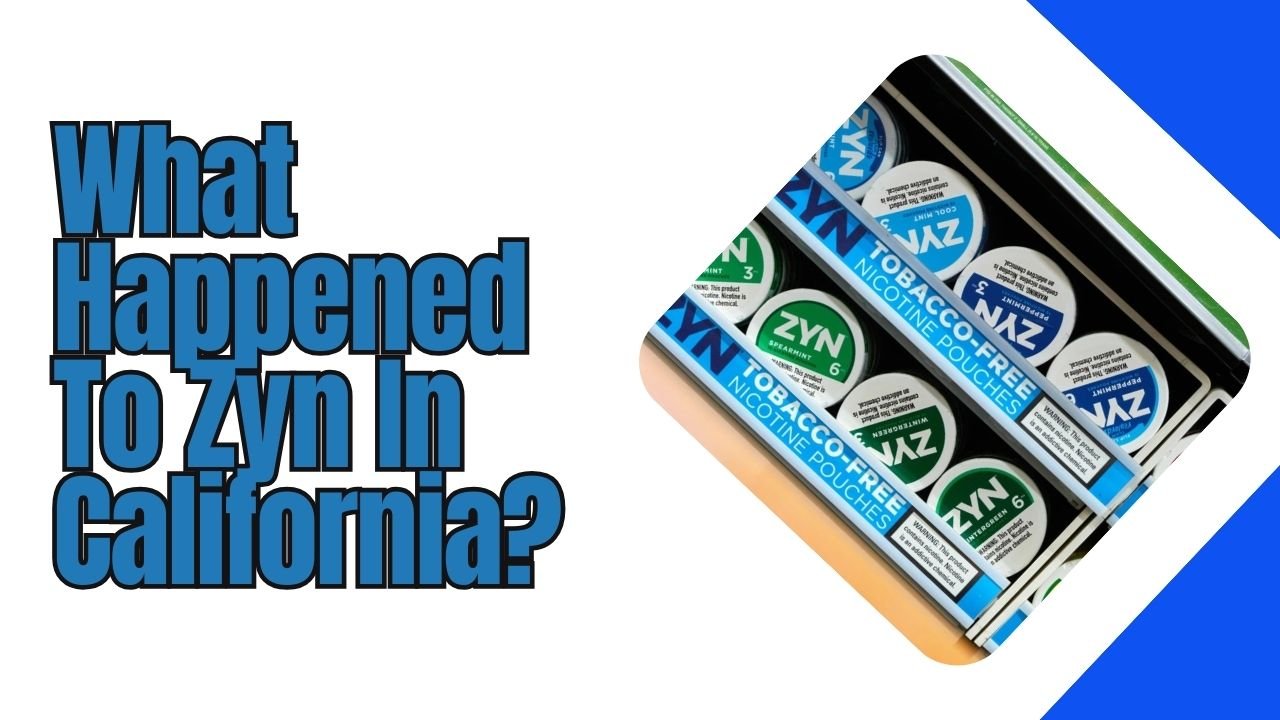What Happened To Zyn In California? In California, Zyn faces legal action for allegedly marketing flavored nicotine pouches in ways that appeal to minors, with accusations of deceptive advertising and promoting addiction risks.
If you’ve seen Zyn nicotine pouches at your local store, you’ve likely noticed their sleek design and variety of flavors, from mint to citrus.
Promoted as a tobacco-free alternative, these pouches have gained immense popularity among adults seeking a cleaner alternative to smoking.
However, in California, Zyn is at the center of a legal and regulatory storm. Let’s delve into what’s happening and why it matters to consumers like you. [What Happened To Zyn In California?]
Contents
What Makes Zyn So Popular?
The Appeal of Flavored Nicotine
Zyn nicotine pouches are smokeless, discreet, and available in flavors reminiscent of candy or chewing gum. [What Happened To Zyn In California?]
Unlike cigarettes or traditional smokeless tobacco, they require no combustion or spitting, making them convenient and attractive to modern consumers.
These attributes have made Zyn particularly appealing to young adults and those trying to quit smoking. [What Happened To Zyn In California?]
Marketing Strategies That Raise Concerns
While Zyn’s marketing primarily targets adult consumers, critics argue that the flavors, packaging, and social media promotions often draw a younger audience.
Platforms like TikTok have played a role in this, with hashtags such as #Zyn accumulating millions of views.
Many of these videos showcase pouches in ways that resonate with teens, raising concerns about their accessibility to underage users. [What Happened To Zyn In California?]
The Legal Battle Brewing in California
The Class-Action Lawsuit
Zyn’s manufacturer, Philip Morris, is facing a class-action lawsuit in California’s Southern District Court. The lawsuit accuses the company of:
- Targeting Minors: Allegedly using flavors, advertising, and packaging designed to appeal to teenagers.
- Misleading Claims: Downplaying the addictive nature of nicotine and promoting the product as “safer” without sufficient evidence.
- Health Risks: Highlighting the high nicotine content in Zyn pouches, which may lead to addiction and long-term health issues, especially among youth.
Potential Implications of the Lawsuit
If you’re a Zyn user, this legal action could result in changes to how the product is marketed and sold. [What Happened To Zyn In California?]
A victory for the plaintiffs might lead to stricter regulations, such as warning labels, age verification measures, or even a redesign of packaging and flavors.
California’s Regulatory Response
Local Bans on Flavored Nicotine
Cities like San Francisco have already taken steps to ban flavored nicotine products, including Zyn. These measures aim to reduce the appeal of such products among minors.
California’s broader stance aligns with its history of progressive public health policies, which often influence nationwide trends.
Impact on Availability
As a consumer, you may notice that flavored nicotine pouches are becoming harder to find in certain areas. [What Happened To Zyn In California?]
Retailers are being monitored more closely to ensure compliance with these new regulations, and violations can result in hefty fines.
The Health Debate: Is Zyn Safer?
Understanding Nicotine Risks
Zyn markets itself as a tobacco-free product, but its pouches contain nicotine derived from tobacco. Nicotine is highly addictive and can pose significant health risks, including:
- Addiction: Especially among young users, who may become dependent quickly.
- Cognitive Impairment: Nicotine can affect brain development in teenagers.
- Cardiovascular Issues: Regular use may increase the risk of heart-related problems.
Ethical Concerns in Marketing
Critics argue that Zyn’s marketing tactics mirror those historically used by big tobacco companies, prioritizing profit over public health.
By emphasizing flavors and trendy packaging, Zyn may be inadvertently appealing to non-smoking teens who then develop nicotine dependencies. [What Happened To Zyn In California?]
Industry Defense: What Philip Morris Says
Philip Morris denies the allegations and insists that Zyn is marketed exclusively to adults seeking alternatives to traditional tobacco.
The company highlights its compliance with age restrictions and its efforts to provide detailed product information.
However, public health advocates remain skeptical, pointing to evidence of underage use and the addictive nature of nicotine. [What Happened To Zyn In California?]
The Future of Nicotine Regulation
What Lies Ahead for Zyn?
The outcome of the lawsuit and the success of local bans will set critical precedents for the nicotine industry.
Stricter marketing regulations and product restrictions could reshape how nicotine alternatives like Zyn are designed, promoted, and sold.
Broader Implications for Consumers
If you’re a nicotine user, these changes may impact your access to flavored products. [What Happened To Zyn In California?]
Additionally, as awareness grows about the potential risks of nicotine pouches, you might see more public health campaigns aimed at educating users about safer choices.
A Call to Action
For consumers like you, the Zyn controversy is an opportunity to engage in critical discussions about nicotine alternatives.
By staying informed, advocating for stronger regulations, and making health-conscious choices, you contribute to shaping a more responsible marketplace.
Whether as a user, parent, or concerned citizen, your voice matters in ensuring that innovation doesn’t come at the expense of public health. [What Happened To Zyn In California?]
See more: Is There Sugar In Zyn? Sugar-Free Nicotine!
Conclusion: A Lesson in Consumer Awareness
The controversy surrounding Zyn highlights the need for informed decision-making when it comes to nicotine products.
Whether you’re a user, parent, or advocate, staying updated on these legal and regulatory developments is crucial.
As California continues to lead the charge in public health policy, the ripple effects of these actions could shape the future of nicotine consumption across the country.
Ultimately, the Zyn debate isn’t just about one product—it’s about the broader responsibility of companies, regulators, and consumers to prioritize health and safety over profit and convenience.
Expanding on Consumer Education
As the controversy grows, one thing is clear: there is a need for more comprehensive consumer education. [What Happened To Zyn In California?]
Users often lack sufficient information about the long-term effects of nicotine pouches. Public health campaigns could focus on the following:
- Highlighting the Risks: Provide transparent, science-based insights into how nicotine affects the body and mind.
- Responsible Use Guidelines: Share advice on how to use such products responsibly, including age-appropriate warnings.
- Alternatives to Nicotine: Promote safer alternatives or strategies for quitting nicotine altogether. [What Happened To Zyn In California?]
FAQs Frequently Asked Questions
What are Zyn nicotine pouches?
Zyn nicotine pouches are small, smokeless packets containing nicotine derived from tobacco. They come in various flavors and are marketed as a cleaner alternative to smoking or chewing tobacco.
Are Zyn pouches legal in California?
Yes, Zyn pouches are legal in California. However, flavored varieties are facing restrictions in some cities like San Francisco due to concerns about their appeal to minors.
Is Zyn addictive?
Yes, Zyn pouches contain nicotine, which is highly addictive. Users can develop dependence, and young people are particularly vulnerable to its effects.
What is the lawsuit against Zyn about?
The lawsuit accuses Philip Morris of targeting minors with Zyn’s flavors and marketing, downplaying addiction risks, and failing to adequately warn users about the product’s health impacts.
Are nicotine pouches safer than cigarettes?
While nicotine pouches eliminate the harmful effects of smoking-related combustion, they still pose risks due to nicotine addiction and potential long-term health issues. They are not risk-free and should be used cautiously.

Meghan Miranda is a freelance writer from Girdwood, Alaska, passionate about storytelling. Her work reflects her creative energy, covering diverse topics with a focus on engaging and meaningful content.
